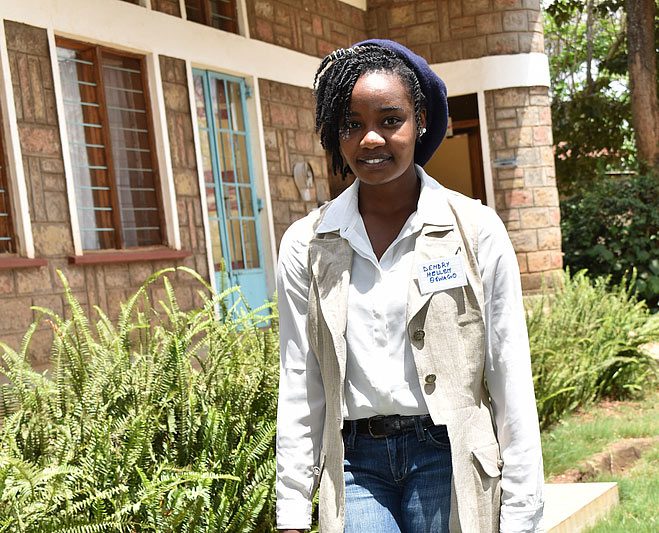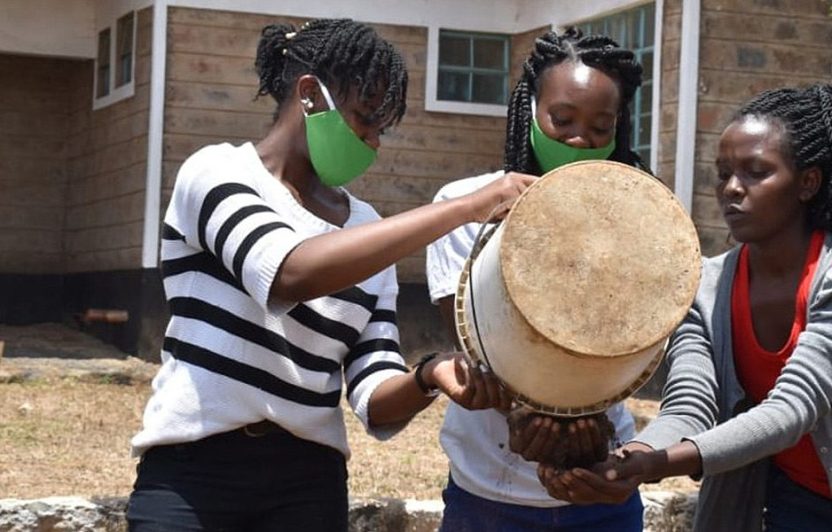
Dendry Hellen Oswago (age 22), grew up in the western part of Kenya a region formerly known as Nyanza Province, in the county Kisumu. Well known of this region is the impressive Lake Victoria – but also the environmental problems the region faces. The endemic fish population disappeared because of introduced species and the lake suffers pollution of chemicals and fertilizers from the agricultural activity.
Witnessing this ecological and social disaster encouraged Dendry Hellen Oswago to learn about environmental friendly agricultural practices that reduce pollution and encourage the rejuvenation of the fragile ecosystem. Dendry started to study Food Science to understand how to reach food sustainability through environmental friendly means. She was one of 48 participants of the 2020 International Training Course on Organic Agriculture (ITCOA) in Kenya, Uganda and Tanzania – a project supported by Biovision.
Biovision has been supporting former ITCOA, now AATC since 2010. More than 400 young researchers and young professionals have been trained to act as agents of change in East Africa’s agricultural systems. One of the participants was Janet Maro, the founder and current co-director of “Sustainable Agriculture Tanzania SAT”, the most important training institution for sustainable agriculture in Tanzania today.
What do you see as major challenges for farmers, particularly smallholders, in Kenya?
Farmers in the semi-arid and arid regions of the country are often affected with unpredictable and adverse weather conditions that greatly affect the quality of their products.They have limited access to quality farming inputs like fertilizers, pesticides and seeds and often opt for easy but hazardous options. Besides problems for health and environment, some of these inputs provoke the dependency on their use, which pushes the farmers into financial struggles and poverty. Lacking access to agricultural knowledge, technologies, training and innovations many farmers end up using less productive, ecologically straining practices.
What do you think are valuable chances and opportunities for smallholder farmers in Kenya?
Farmers in Kenya are still in touch with the knowledge of ancient agricultural practices. Combined with eco-friendly technologies and innovations, this knowledge is a valuable resource to improve food production in sustainable ways.
How important was ITCOA for you to improve your knowledge on ecological agriculture?
The ITCOA 2020 experience helped me understand the natural ecosystem cycle and how conventional agriculture has greatly contributed to its deterioration. I learned that farmers need to work towards mimicking nature to get prosperous agroecological production. This way, the natural cycles will be preserved and biodiversity will flourish above and below the soil. It has been evident that the only way to do this is through the combination of new but eco-friendly technologies and traditional knowledge on farming practices.
Which theoretical, practical and personal learnings are you taking home from the course?
ITCOA gave me a profound understanding of ecological agriculture and taught me the strengths of thinking in systems and along value chains. The course also empowered me with strong entrepreneurship and marketing skills.
I’ve also returned home well-equipped with new practical skills from the field trainings and with knowledge on the importance of bio-fertilizers, organic animal feeds and organic pesticides for an ecologically friendly and healthy food production. These practices allow cutting the cost of food production and improving food security. They contribute to ecological sustainability without compromising on food quality and economic profits, which are both major contributing factors to the people’s health and well-being. I further learnt that on-farm processing of agricultural produce are a valuable mean to preserve harvests and to add and diversify their value.
Let us know about your personal plans in the future. Where do you see yourself in 5 or 10 years?
I plan to establish a consultancy firm that will work with local farmers towards achieving sustainable and profitable food production. I would also like to engage in processing to support farmers in promoting value addition and product diversification for their fruits and vegetables. Maybe I can also collaborate with schools, to inspire students and nurture the young minds in sustainable agriculture.
I am very happy to be part of the alumni network of ITCOA now, it’s a great platform to keep us together, so we can go on exchanging our knowledge, benefit from our experiences and motivate each other. I will use these connections to create movements and projects that advocate for agroecology in East Africa and beyond.


